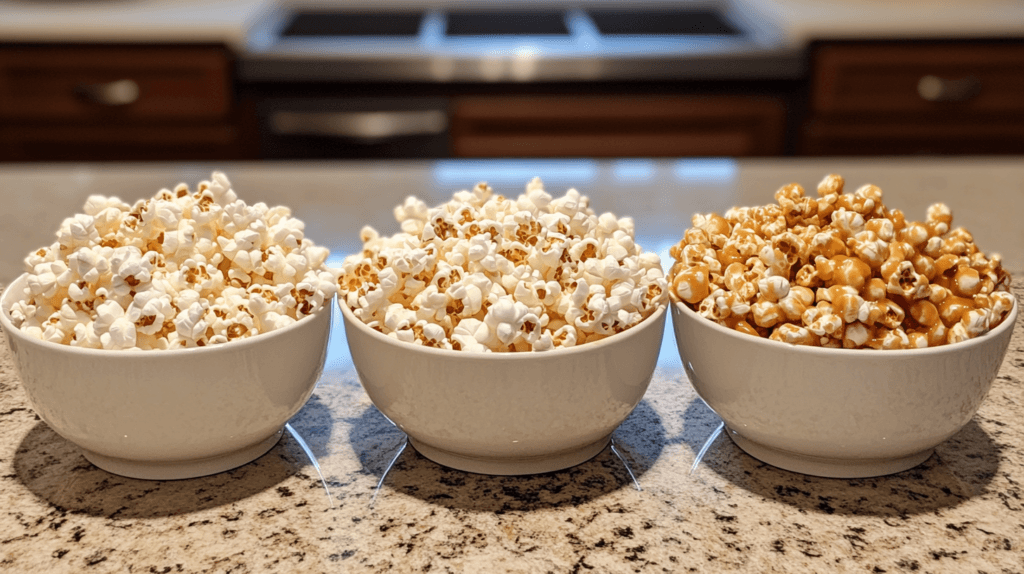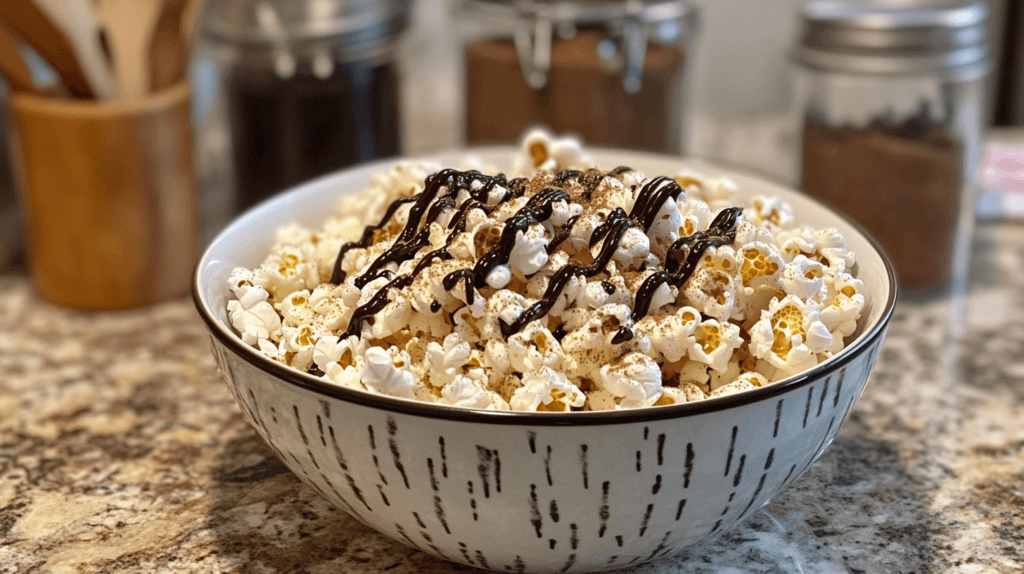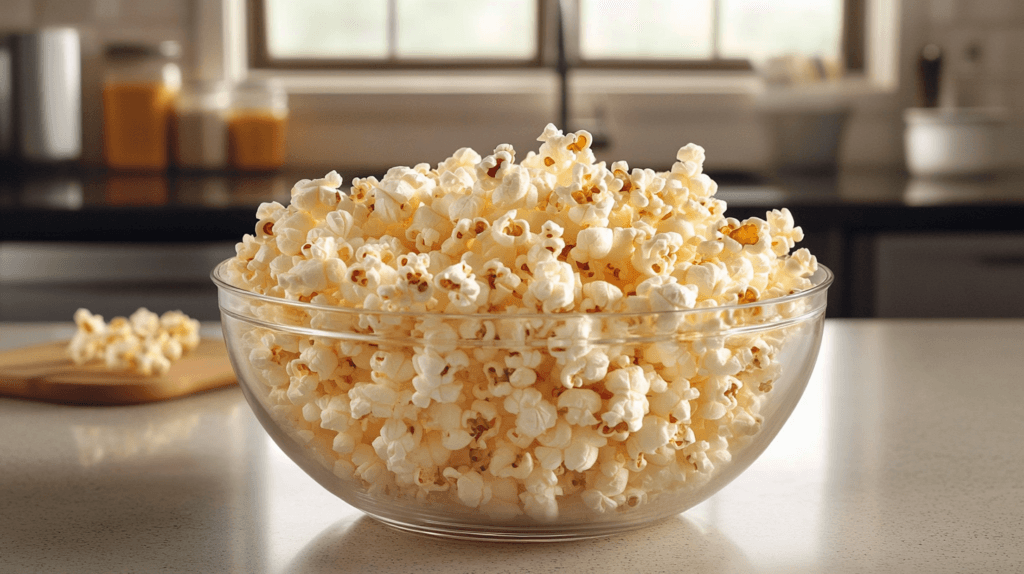Popcorn is a beloved snack worldwide, enjoyed at movie nights, fairs, and even as a healthy treat at home. But if you’re someone who follows a gluten-free diet—whether due to celiac disease, gluten intolerance, or personal choice—you may wonder, “Is popcorn gluten free?” The answer isn’t as straightforward as it seems, and that’s why we’re diving deep into this question. From understanding what gluten is to exploring how popcorn fits into a gluten-free lifestyle, this guide will break it all down for you.
Let’s pop into the details (pun intended) and learn more about popcorn, gluten, and how to ensure your snack is safe and enjoyable!
Table of Contents
What is Gluten?
Gluten is a protein naturally found in certain grains, including wheat, barley, and rye. Its primary role in foods is to act as a binding agent, giving dough its elasticity and helping baked goods maintain their shape and texture. Think about the chewiness of a fresh loaf of bread or the firmness of pasta—those characteristics are thanks to gluten.
For most people, gluten is completely harmless and even provides a small amount of protein to their diet. However, for individuals with gluten-related disorders, such as celiac disease or gluten sensitivity, gluten can trigger serious health issues.
Common Sources of Gluten
Gluten is present in a wide variety of foods, particularly those made from wheat, barley, or rye. Here are some of the most common gluten-containing products:
- Bread and baked goods: Including cakes, muffins, bagels, and pastries.
- Pasta: Made from wheat flour unless explicitly labeled as gluten free.
- Cereals: Many breakfast cereals contain barley malt or wheat.
- Beer and malt beverages: Barley is a primary ingredient in most beers.
- Processed foods: Items like sauces, dressings, gravies, and soups may contain gluten as a thickener or flavoring agent (e.g., soy sauce, malt vinegar).
Who Needs to Avoid Gluten?
There are three main groups of people who need to avoid gluten:
- Individuals with Celiac Disease: This autoimmune disorder causes the immune system to attack the small intestine when gluten is consumed, leading to malabsorption of nutrients and other health complications.
- Those with Non-Celiac Gluten Sensitivity (NCGS): While they don’t have celiac disease, they may experience symptoms like bloating, headaches, or fatigue after consuming gluten.
- People with Wheat Allergy: This is different from celiac disease and involves an allergic reaction to proteins in wheat, including gluten.
Understanding what gluten is and how it’s hidden in many processed foods is the first step toward managing a gluten-free lifestyle.
What is Popcorn?
Popcorn is a type of whole grain made from a specific variety of corn kernel that pops when heated. Unlike other corn varieties, popcorn has a unique structure that allows it to expand and burst into a fluffy, edible form when exposed to high temperatures.
How Does Popcorn Pop?
Popcorn kernels contain a small amount of water trapped inside their hard outer shell, also known as the hull. When the kernel is heated, the water turns to steam, building pressure inside the hull. Eventually, the pressure becomes too much, and the kernel bursts, flipping inside out and forming the airy, crunchy snack we all love.
Types of Popcorn
Popcorn is a versatile snack that comes in several forms, such as:
- Plain or Air-Popped Popcorn: Made without added oils or flavors, this is the healthiest and simplest form of popcorn.
- Microwave Popcorn: Pre-packaged kernels with oil and flavorings designed for easy preparation in a microwave.
- Flavored Popcorn: Includes varieties like caramel, cheese, or chocolate-coated popcorn.
Nutritional Benefits of Popcorn
Popcorn is more than just a fun movie snack; it’s also packed with nutrients:
- Whole Grain: Popcorn is 100% whole grain, making it a good source of dietary fiber.
- Low in Calories: Air-popped popcorn is low in calories, with about 30 calories per cup.
- Rich in Antioxidants: Popcorn contains polyphenols, which help fight free radicals in the body.
- Naturally Gluten Free: As we’ll explore further, popcorn is naturally free from gluten, making it a great snack for gluten-sensitive individuals.
Despite being naturally healthy, the nutritional profile of popcorn can vary widely depending on how it’s prepared. Added oils, butter, and flavorings can increase calories and introduce gluten-containing ingredients.
Is Popcorn Gluten Free?
The short answer is yes—popcorn in its natural, unprocessed form is gluten free. This is because popcorn is made from corn, a grain that does not contain gluten. For individuals with gluten intolerance, celiac disease, or wheat allergies, plain popcorn is generally safe to eat and can even be a nutritious snack option.
Why is Plain Popcorn Gluten Free?
Popcorn is classified as a whole grain and does not contain any of the gluten proteins found in wheat, barley, or rye. When popcorn is prepared without additional ingredients, it remains naturally free from gluten, making it an excellent snack for people with dietary restrictions.
For example:
- Air-Popped Popcorn: Made using only heat, air-popped popcorn is completely gluten free and free from added oils, butter, or seasonings.
- Stovetop Popcorn: When cooked with gluten-free oils and seasonings, stovetop popcorn is another safe option for gluten-sensitive individuals.
What About Contamination Risks?
While plain popcorn is naturally gluten free, the risk of gluten exposure increases when:
- Popcorn is Processed: Pre-packaged popcorn may be produced in facilities that also process wheat-based products, leading to cross-contamination.
- Ingredients are Added: Flavored popcorn often contains seasonings or additives like malt flavoring, which may contain gluten.
To avoid these risks, choose popcorn products labeled as “gluten free” or certified by organizations like the Gluten-Free Certification Organization (GFCO). Alternatively, making popcorn at home with gluten-free ingredients ensures that it’s safe to eat.
Benefits of Naturally Gluten-Free Popcorn
For individuals with dietary restrictions, popcorn is an ideal snack because:
- It’s naturally safe for those avoiding gluten.
- It’s easy to customize with gluten-free seasonings and toppings.
- It’s widely available and affordable, making it an accessible option for anyone.
Types of Popcorn and Gluten Risk

Pre-packaged Popcorn
Pre-packaged popcorn, such as those sold in bags at the grocery store, may contain added ingredients like butter flavoring or seasoning blends. Some of these ingredients might include gluten-containing additives or face cross-contamination during production.
Movie Theater Popcorn
Movie theater popcorn is a gray area for gluten-free eaters. While the popcorn itself is usually gluten free, the butter or toppings used in theaters may not be. Additionally, there’s a risk of cross-contamination in popcorn machines. If you’re unsure, ask theater staff for ingredient details or skip the toppings altogether.
Gourmet and Flavored Popcorn
Gourmet popcorn, like caramel-coated or cheese-flavored varieties, often contains additional ingredients that may not be gluten free. Check labels carefully or opt for brands that specifically state their products are gluten free.
How to Ensure Your Popcorn is Gluten Free
Checking Labels for Gluten-Free Certification
To make sure your popcorn is safe to eat, always read the packaging. Look for labels that clearly state “gluten free.” Certified gluten-free products go through rigorous testing to ensure they meet safety standards for people with celiac disease or gluten sensitivity.
Some key things to look for on labels include:
- Certified Gluten-Free Symbol: This stamp of approval means the product contains less than 20 ppm (parts per million) of gluten.
- Ingredient List: Avoid any popcorn that lists wheat, barley, rye, or malt (e.g., malt flavoring).
- Allergen Statements: These often mention whether the product was made in a facility that processes gluten-containing foods.
Ingredients to Avoid in Popcorn
When buying flavored or packaged popcorn, watch out for potential gluten-containing ingredients. Some of the most common offenders include:
- Malt flavoring: Often used in caramel or sweet popcorn varieties.
- Modified food starch: Can sometimes be made from wheat.
- Soy sauce or seasonings: Certain flavor blends might include wheat-based additives.
Sticking to simple, naturally flavored popcorn is your best bet if you’re unsure about the ingredients.
Gluten-Free Popcorn Brands to Consider
Popular Gluten-Free Options
Several popcorn brands cater specifically to gluten-free eaters, ensuring their snacks are both safe and delicious. Some trusted names include:
- SkinnyPop: Known for its simple, natural ingredients, SkinnyPop offers a range of gluten-free options, including sea salt and sweet varieties.
- Boom Chicka Pop: This brand specializes in gluten-free popcorn with fun flavors like sweet & salty kettle corn and white cheddar.
- Lesser Evil: With certified gluten-free and organic products, this brand is a great choice for health-conscious snackers.
Where to Buy Gluten-Free Popcorn
You can find gluten-free popcorn at most grocery stores, specialty health food stores, or online retailers like Amazon. Look in the snack aisle or the section dedicated to gluten-free foods. For those who prefer homemade popcorn, gluten-free kernels are widely available.
Popcorn Recipes for Gluten-Free Diets

Simple Homemade Gluten-Free Popcorn
Making popcorn at home is one of the easiest ways to ensure it’s gluten free. Here’s a quick recipe:
Ingredients:
- ½ cup of plain popcorn kernels
- 2 tablespoons of vegetable oil or coconut oil
- Sea salt to taste
Instructions:
- Heat the oil in a large pot over medium heat.
- Add a few popcorn kernels to test the oil. When they pop, add the rest of the kernels.
- Cover the pot, leaving a small gap for steam to escape, and shake it occasionally to prevent burning.
- Once popping slows down, remove from heat and season with sea salt.
Creative Gluten-Free Popcorn Toppings
Plain popcorn is great, but you can spice it up with these gluten-free topping ideas:
- Sweet: Drizzle with melted dark chocolate and sprinkle with shredded coconut.
- Savory: Toss with nutritional yeast, garlic powder, and paprika for a cheesy flavor.
- Spicy: Add a pinch of cayenne pepper and lime zest for a zesty kick.
The Health Benefits of Gluten-Free Popcorn
Popcorn as a Snack for Celiac Disease
For people with celiac disease, gluten-free popcorn is a fantastic snack option. It’s naturally safe (when prepared correctly), easy to digest, and full of fiber to support gut health.
Why Gluten-Free Popcorn is a Healthy Choice
Popcorn is low in calories, rich in antioxidants, and a good source of whole grains. When prepared without excess butter or sugar, it can be a guilt-free treat for anyone following a gluten-free lifestyle.
Gluten-Free Popcorn: FAQs
Is Popcorn Safe for People with Gluten Sensitivity?
Yes! Plain popcorn made from corn kernels is naturally gluten-free and safe for those with gluten sensitivity. For example, like corn tortillas, popcorn is a great corn-based option for those avoiding gluten. However, be cautious with flavored or processed varieties that may introduce gluten through additives or cross-contamination.
Can Gluten-Free Popcorn Be Contaminated?
Unfortunately, cross-contamination is always a risk, especially with packaged or movie theater popcorn. Look for certified gluten-free products or make your popcorn at home to avoid contamination. For meal inspiration, check out these gluten-free dinner recipes for a complete safe-eating plan.
Are There Gluten-Free Alternatives to Popcorn?
If you’re looking for variety, there are plenty of gluten-free snack options to enjoy. Alongside popcorn, explore other corn-based options like toasted corn or sweet treats such as gluten-free cookies—like the ones featured in this Crumbl Cookies guide.
Conclusion: Enjoying Popcorn on a Gluten-Free Diet
Popcorn, in its purest form, is naturally gluten-free and a wonderful snack for those following a gluten-free diet. However, added ingredients or processing methods can introduce risks. To enjoy your popcorn worry-free, always check labels, choose certified gluten-free brands, or make it yourself at home. Additionally, for those interested in cultural cuisine, learning what Puerto Ricans eat for dinner can offer a variety of gluten-free inspirations.
So, grab a bowl of popcorn and snack confidently, knowing it’s a safe and tasty option for your gluten-free lifestyle!
Printable Recipe Card
Want just the essential recipe details without scrolling through the article? Get our printable recipe card with just the ingredients and instructions.

